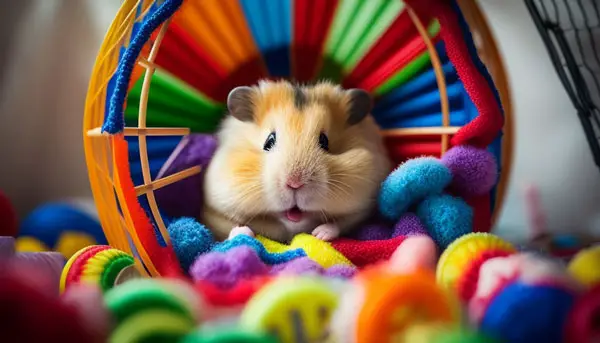Overweight Hamster: What To Do If Your Hamster Is Fat
At a glance, it’s hard to say your hamster is fat. Its fluffy fur and natural shape eventually spread a misconception about its overweight. In short, deciding on the fatty context is difficult.
But what if you have an overweight hamster: what to do if your hamster is fat? The direct solutions are to check and adjust the food’s portioning, change the types of food, ensure that it exercises a lot, and consult a vet (if necessary).
In this article, we answer the question in detail while also demonstrating the fatty context identification process. In addition, you will also get information regarding the reasons for the hamster’s weight gain.
Overweight Hamster: Causes and What to Do If Your Hamster is Fat?
First of all, we suggest you not be emotionally overwhelmed; millions of hamster owners face the same problem. This section is designated for those worried pet owners, elaborating on the root causes and solutions.

Root Causes that Make Your Hamster Fat
Remember the below-listed points in the table to take preventive measures in advance.
| Root Causes | What to do |
|---|---|
| Overfeeding, intentionally or unintentionally | Just give them two spoons of food per day |
| Unbalanced supplied diet | Mix the stored food with fresh vegetables, hang a mineral or salt lick inside the cage, supply fresh water, do not give any junk food |
| Exercise equipment is not enough in the cage | Put a variety of exercise and play items in its cage, like ladders, rollers, wheels, tunnels, etc. |
| Your hamster’s movement is limited within the cage | Allow the pet to roam around the house or at least allow its movement within your room |
| Genetics issue | We recommend that you contact a veterinarian |
| Your hamster is pregnant | Ensure an adequate supply of fresh water, provide good quality food, maintain cleanliness, avoid playing with it, and consult the vet |
What to Do If Your Hamster Is Fat?
Now, you already know the root causes of your hamster’s obesity. Identify the specific cause in your case and take action accordingly.

1. Feeding too Much
It is one of the most common causes of hamster obesity. Review the amount of food you are providing daily. If you provide more than 2 spoons (one ounce) of food per day, your hamster will surely gain weight.
Also, you shouldn’t become confused by seeing the empty pots in the cage. Hamsters’ natural characteristic allows them to store food within their cheeks.
What to do?
- Just give them two spoons of food per day
- The best thing you can do is watch when it eats (morning or evening) and fill the food container before the time (and only once)
- Don’t overdo the affection
2. Unbalanced Diet
We see many hamster lovers relying on stored foods. They think that, as those foods are specialized, they can provide more nutrients. If you are one of them, unfortunately, you are on the wrong track.
Although stored foods have high nutrient values, the residing vitamins, fats, and so on eventually exceed the actual nutrition requirement.

Also, most pet food producers consider the natural settings of the pets when selecting the ingredients and quantity. Whereas the pet is not living in the wild anymore. It is living in a house with a reduced level of options for activity.
And pets living in the wild require more nutrition than pets living in a household setting. So, the result is simple: excess nutrition will trigger obesity in your hamster.
What to do?
Below are our suggestions, which you should follow.
- Mix the stored food with fresh vegetables. After all, hamsters are omnivores
- Hang a mineral or salt lick inside the cage
- Always supply fresh water; try to change the water every 12 hours
- Do not give any junk food like popcorn, chocolate, soda, chips, etc., though it will try to convince you in many ways to have those while you are eating
3. Lack of Exercise
Hamsters are naturally very active. In a wild setting, you can always see them doing something. Though your hamster is a pet, it cannot abandon its basic instincts.
If the cage is not equipped with a variety of exercise tools and equipment, it won’t have many options. It will just go “round and round,” resulting in less fat burn and degraded digestion. It will eventually gain weight.
What to do?
So, put a variety of exercise and play items in its cage, like ladders, rollers, wheels, tunnels, etc.
Check this YouTube link to know more about hamster exercise training:
4. Movement Restriction
There are so many considerations that can force you to restrict your hamster’s movement within the cage. It opposes the basic nature (free roaming around) of the hamster and causes problems for its digestive system and mental well-being. Finally, it gains weight.
What to do?
We suggest you allow the pet to roam around the house or at least allow its movement within your room. This will not only keep it in shape but will also help it become acquainted with its surroundings and feel less stressed. By encountering less stress, many health issues of the pet will be diminished.
5. Genetics Issue
Like every other animal on the planet, your hamster also bears the genes of its ancestors. For instance, if it is below the standard “Laptins,” gaining weight is unavoidable. Leptins are the body’s natural protector against weight gain or obesity.
What to do?
In this case, there is not much you can do. Food change, controlling food portioning, or heavy exercise—nothing will work.
To obtain clinical solutions, we recommend that you contact a veterinarian.
6. Your Hamster is Pregnant
It is a piece of good news! But it also forces your pet to gain weight. However, it is very natural.

What to do?
If it is pregnant, you should take the below measures to keep it fit.
- Ensure an adequate supply of freshwater
- Provide good quality food (boiled eggs, partially cooked beef or chicken, fruits, vegetables, specialized store foods, etc.)
- Maintain the cleanliness of the cage and its movement area
- Avoid playing with it during pregnancy
- Consult the vet
How to Be Sure That Your Hamster is Fat?
As mentioned earlier, deciding that your hamster is fatty is not a matter of assumption. You must use analytical methods to determine whether it is actually fat or just looks fat.

Well, it is very simple. All you need to do is compare its weight against the standard. We have listed some popular hamsters’ standard weights.
- Syrian Hamster: weighs between 100 and 225 grams and measures 15-20 cm in length
- Dwarf hamsters weigh between 22 and 50 grams and measure 7 to 10.5 cm in length
- Chinese Hamster: weighs between 28 and 50 grams and measures 21 to 33 cm in length
- Campbell’s Dwarf Hamster: weighs between 30 and 60 grams and measures 8 to 11 cm in length
- Winter White Dwarf Hamster: weighs between 20 and 45 grams and measures 9 to 11 cm in length
To compare the actual weight against the standard, please follow the below steps:
Step 1: Take a weight machine
Step 2: Place a cup on it and record the cup’s weight
Step 3: Place the hamster inside the cup
Step 4: Record the weight
Step 5: Deduct the cup weight from the final weight
Step 6: Actuals should be compared to the standard
Why You Must Take Action Against Hamster Obesity?
Below are the reasons you should consider taking immediate action if your hamster is suffering from obesity.

- It might have heart problems
- Overweight hamsters have a greater chance of developing diabetes and liver problems
- And many other physical and mental issues that can decrease its life span
FAQs
Below are the answers to some common questions regarding hamster obesity.
Q: Can hamsters die of obesity?
No. It is not going to die overnight from excessive weight. But several health issues can be oriented due to excessive weight. These health issues will shorten hamsters’ lives.
Q: Do hamsters gain weight in the winter?
It depends. Studies show that Syrian hamsters don’t gain or lose weight in the winter, but Siberian hamsters lose a lot of weight in the winter.
For the Siberian hamster, its natural characteristics force it to consume less food (as less is available) in the winter and cover the energy requirements from the stored body fat.
Q: How much should a Syrian hamster weigh?
As per standard, a Syrian hamster’s standard weight ranges between 100 and 225 grams in proportion to its 15–20 cm length.
Final Thoughts
We hope we have covered the context of an overweight hamster: What to do if your hamster is fat? Now you know how to be sure that your hamster is overweight and how to address obesity.
If you can ensure free movement and a cage with sufficient exercise tools, your hamster will never gain more weight than it needs. Still, you must take precautions in case of excessive feeding; just be strict with 2 spoons per day.




